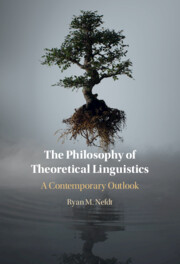Book contents
1 - Introduction
Published online by Cambridge University Press: 25 April 2024
Summary
In this chapter, the remit of theoretical linguistics is located within the background of a set of theoretical questions. These questions pertain to issues of ontology, methodology, acquisition, communication, and evolution. The overarching field is distinguished from other pursuits within applied linguistics that have a more practical focus but are argued to subsume certain experimental approaches. The first part of the chapter discusses the role of grammaticality and formal grammars in linguistic theory. Here, the issue of whether the rules of language have normative force is introduced as well as whether the target of scientific linguistics is individual languages or some universal core of human language generally. The question of what a grammar is, a theory, model, or some other device, is presented based on a brief literature review on the topic with a nudge towards a certain scientific instrumentalism about these matters. Next, the chapter asks whether linguistics is best viewed as an empirical social or cognitive science. Arguments are presented on both sides. Naturalism and normativity figure prominently in this debate. Finally, an outline of each chapter of the book is provided with an aim to either precisify or reflect on the philosophical issues presented in this opening chapter.
Keywords
- Type
- Chapter
- Information
- The Philosophy of Theoretical LinguisticsA Contemporary Outlook, pp. 1 - 22Publisher: Cambridge University PressPrint publication year: 2024

